Related Research Articles
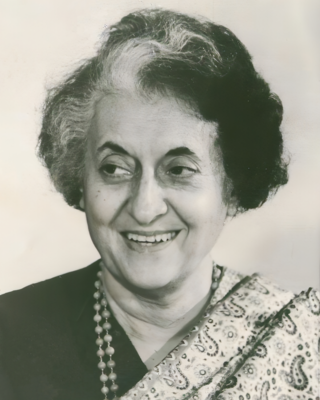
Indira Priyadarshini Gandhi was an Indian politician and stateswoman who served as the Prime Minister of India from 1966 to 1977 and again from 1980 until her assassination in 1984. She was India's first and, to date, only female prime minister, and a central figure in Indian politics as the leader of the Indian National Congress (INC). She was the daughter of Jawaharlal Nehru, the first prime minister of India, and the mother of Rajiv Gandhi, who succeeded her in office as the country's sixth prime minister. Gandhi's cumulative tenure of 15 years and 350 days makes her the second-longest-serving Indian prime minister after her father. Henry Kissinger described her as an "Iron Lady", a nickname that became associated with her tough personality.

Jawaharlal Nehru was an Indian statesman who was a central figure in India during the middle of the 20th century. Nehru was second only to Mahatma Gandhi in leading the Indian nationalist movement in the 1930s and 1940s, and upon independence from Britain in 1947 served as India's first prime minister until his death in 1964. A secular humanist and social democrat, Nehru championed parliamentary democracy, secularism, science and technology, influencing India's arc as a modern nation. In international affairs, he kept India out of the two blocs of the Cold War and was a founder of the Non-Aligned Movement. Nehru was also a prolific author in English, and his works including An Autobiography (1936) and The Discovery of India (1946) have been read and deliberated upon around the world.

The Indian National Congress (INC), colloquially the Congress Party or simply the Congress, is a political party in India with deep roots in most regions of India. Founded on 28 December 1885, it was the first modern nationalist movement to emerge in the British Empire in Asia and Africa. From the late 19th century, and especially after 1920, under the leadership of Mahatma Gandhi, the Congress became the principal leader of the Indian independence movement. The Congress led India to independence from the United Kingdom, and significantly influenced other anti-colonial nationalist movements in the British Empire.

Feroze Jehangir Gandhi was an Indian freedom fighter, politician and journalist. He served as a member of the provincial parliament between 1950 and 1952, and later a member of the Lok Sabha, the Lower house of Indian parliament. He published The National Herald and The Navjivan newspapers. His wife, Indira Gandhi, and their elder son Rajiv Gandhi were both prime ministers of India. He was a member of Indian National Congress.
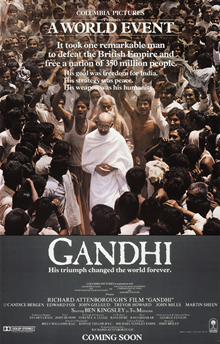
Gandhi is a 1982 epic biographical film based on the life of Mahatma Gandhi, a major leader in the Indian independence movement against the British Empire during the 20th century. A co-production between India and the United Kingdom, the film was directed and produced by Richard Attenborough from a screenplay written by John Briley. It stars Ben Kingsley in the title role. The biographical film covers Gandhi's life from a defining moment in 1893, as he is thrown off a South African train for being in a whites-only compartment and concludes with his assassination and funeral in 1948. Although a practising Hindu, Gandhi's embracing of other faiths, particularly Christianity and Islam, is also depicted.

The Janata Party is an unrecognised political party in India. It was founded as an amalgam of Indian political parties opposed to the Emergency that was imposed between 1975 and 1977 by Prime Minister Indira Gandhi of the Indian National Congress. In the 1977 general election, the party defeated the Congress and Janata leader Morarji Desai became the first non-Congress prime minister in independent modern India's history.

Lucie, Lady Duff-Gordon was an English author and translator who wrote as Lucie Gordon. She is best known for her Letters from Egypt, 1863–1865 (1865) and Last Letters from Egypt (1875), most of which are addressed to her husband, Alexander Duff-Gordon, and her mother, Sarah Austin. Having moved in prominent literary circles in London, she contracted tuberculosis and travelled in 1861 to South Africa for health reasons. She travelled on to Egypt in 1862 where she settled in Luxor, learnt Arabic, and wrote many letters about Egyptian culture, religion, and customs. Her letters are notable for humour, outrage at the ruling Ottomans, and many personal stories from the people around her.

Motilal Nehru was an Indian lawyer, activist, and politician affiliated with the Indian National Congress. He served as the Congress President twice, from 1919 to 1920 and from 1928 to 1929. He was a patriarch of the Nehru-Gandhi family and the father of Jawaharlal Nehru, India's first Prime Minister.
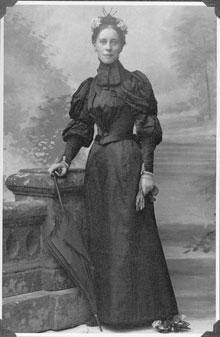
For the English novelist, see Mary St Leger Kingsley.

Nayantara Sahgal is an Indian writer who writes in English. She is a member of the Nehru–Gandhi family, the second of the three daughters born to Jawaharlal Nehru's sister, Vijaya Lakshmi Pandit.

The Emergency in India was a 21-month period from 1975 to 1977 when Prime Minister Indira Gandhi declared a state of emergency across the country by citing internal and external threats to the country.
Shah Commission was a commission of inquiry appointed by Government of India in 1977 to inquire into all the excesses committed in the Indian Emergency. It was headed by Justice J.C. Shah, a former chief Justice of India.
Padmaja Naidu was an Indian freedom fighter and politician who was the 4th Governor of West Bengal from 3 November 1956 to 1 June 1967. She was the daughter of Sarojini Naidu.
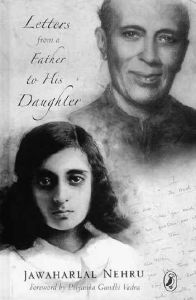
Letters from a Father to His Daughter is a collection of letters written by Jawaharlal Nehru to his daughter Indira Nehru, originally published in 1929 by Allahabad Law Journal Press at Nehru's request and consisting of only the 30 letters sent in the summer of 1928 when Indira was 10 years old. He arranged a second edition in 1931 and subsequently, further reprints and editions have been published.
Richard John Briley was an American writer best known for screenplays of biographical films. He won the Best Original Screenplay Oscar at the 55th Academy Awards for Gandhi (1982). As well as film scripts, he wrote for television and theatre, and published several novels.
The State of Uttar Pradesh v. Raj Narain was a 1975 case heard by the Allahabad High Court that found the Prime Minister of India Indira Gandhi guilty of electoral malpractices. The ruling on the case that had been filed by the defeated opposition candidate, Raj Narain, Justice Jagmohanlal Sinha invalidated Gandhi's win and barred her from holding elected office for six years. The decision caused a political crisis in India that led to the imposition of a state of emergency by Gandhi's government from 1975 to 1977.
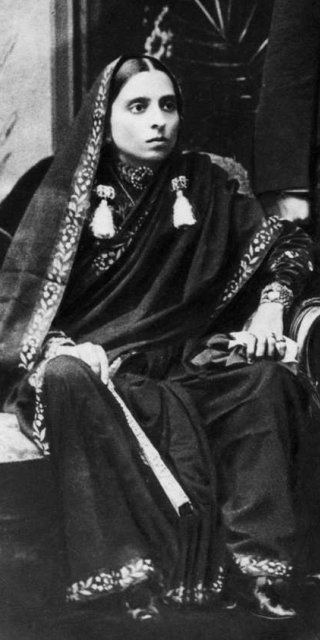
Swarup Rani Nehru was an Indian independence activist. She was the wife of barrister and Indian National Congress leader Motilal Nehru and the mother of India's first Prime Minister, Jawaharlal Nehru.

Ranjit Sitaram Pandit was an Indian barrister, politician, author and scholar from Rajkot in the Kathiawar region of British India. He is known for his role in the Indian non-cooperation movement, and for translating the Sanskrit texts Mudrarakshasa, Ṛtusaṃhāra and Kalhana's Rajatarangini into English.

Shobha Nehru, commonly known as Fori Nehru and Auntie Fori, was a Hungarian-born Indian social worker and the wife of the Indian civil servant Braj Kumar Nehru of the Nehru family.
Raj Kaul, according to the Nehru family tradition, was an Indian Sanskrit and Persian scholar from Kashmir, who had been recruited in 1716 by the then Mughul Emperor, Farrukhsiyar, to move to Old Delhi, where he settled near a canal and came to be known with a hyphenated Kaul-Nehru, with Nehru evolving from the word nehar, meaning canal. He was later noted as the earliest known member of the Nehru-Gandhi family. As a result, several Nehru member biographies generally begin with Kaul's story.
References
- ↑ Harman, Claire (23 April 1994). "Book Review: Traveller's checks and bank balances: 'Lucie Duff Gordon: A Passage to Egypt'". The Independent . Retrieved 22 May 2016.
- ↑ Alibhai-Brown, Yasmin (25 March 2001). "A dynasty nastier than Dallas". The Guardian . Retrieved 22 May 2016.
- ↑ Hackett, Rosalind I. J.; Kingsley, Mary H.; Frank, Katherine (February 1991). "Travels in West Africa". Journal of Religion in Africa . 21 (1): 78. doi:10.2307/1581095. JSTOR 1581095.